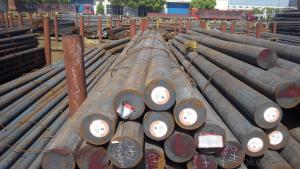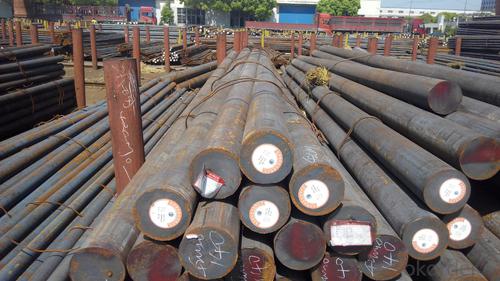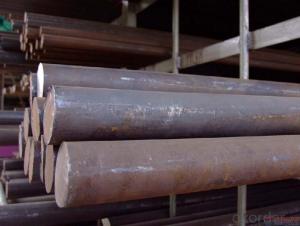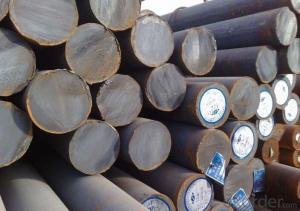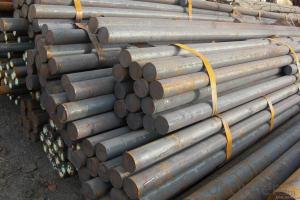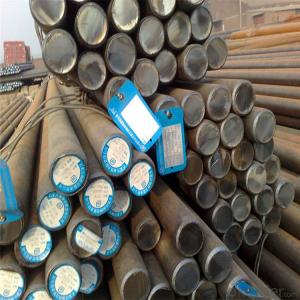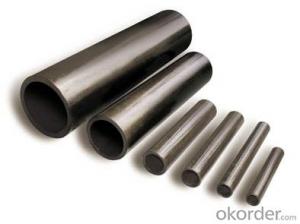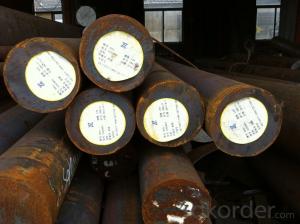Cold Rolled SAE 1045 AISI 1045 CK45 S45C Carbon Steel
- Loading Port:
- China main port
- Payment Terms:
- TT OR LC
- Min Order Qty:
- 30 m.t.
- Supply Capability:
- 10000 m.t./month
OKorder Service Pledge
OKorder Financial Service
You Might Also Like
Specification
Cold Rolled SAE 1045 AISI 1045 CK45 S45C Carbon Steel
Product Information:
Characteristic of s45c carbon steel
Thickness:3-5000mm
Width:2000-2300mm or as custom's request
Length:2-12m,as your requirment
Technique:Cold rolled or hot rolled
Surface treatment:Bare, galvanized coated or as customer's requirements.
Standard:ASTM,EN,GB,JIS,GB
Material:A283Gr.D/A573Gr.65,A516Gr65,A516Gr70,A284Gr.D
SS400,SS300,CCSB A36,A32,LRA32,LRB,Q235
Q195,Q235,Q345,SS400,ASTM A36,E235B
Terms of Payment;L/C or T/T
Chemical composition:C≤0.004%;Si≤0.030%;Mn ≤0.17%;P≤0.012%;S≤0.010%; Fe balance
Delivery Detail:within 30 days once receive deposite or confirm L/C
Packing:Standard export packing,or as requirement
Applications of s45c carbon steel
Automobile,Bridges, Buildings,
Machinery,Pressure,vessel;industries.
Ship building,Engineering construction
Mechanical manufacturing,Pavement slab,ect.
Product Overviews:
| Product Name | Typical Grades | Diameter(mm) | Standard adopted |
| Carbon Steel | 20 (1020/S20C/C22) | Ø16-Ø300 | GB/SAE/JIS/DIN |
| 40 (1040/S40C/C40) | |||
| 45 (1045/S45C/C45) | |||
| Bearing Steel | GCr9 (51100/SUJ1) | Ø12-Ø250 | |
| GCr15 (52100/SUJ2/100Gr6) | |||
| GCr9SiMn (A485-Gr.1/SUJ3) | |||
| Cr-Mo Steel | 20Cr (5120/SCr420H/20Cr4) | Ø12-Ø250 | |
| 40Cr (5140/SCr440/41Cr4) | |||
| 42CrMo(4140/SCM440/42CrMo4) | |||
| Gear Steel | 20CrNiMo | Ø16-Ø600 | |
| 20CrMn(5115/SMnC420/20MnCr5) | |||
| 20CrNiMo(8620/SNCM220/20CrMiMo2) |
Product Show:

Our Advantages:
· Industry experience over 20 years.
· Shipment of goods -More than 70 countries worldwide.
· The most convenient transport and prompt delivery.
· Competitive price with best service.
· High technical production line with top quality products.
· High reputation based on best quality products.
With our experienced, enthusiastic and dynamic staffs, we assure to bring you the products with best quality, reasonable prices and good after-sales services under the motto: Friends First, Business After.
Communication, Experience, Expertise and Best efforts are our Promises to you.
- Q: How is stainless steel used in food processing?
- Stainless steel is widely used in food processing due to its hygienic properties, durability, and resistance to corrosion. It is used to manufacture various equipment and components such as storage tanks, piping systems, mixing tanks, cutting tools, and food preparation surfaces. The non-reactive nature of stainless steel prevents it from imparting any flavors or odors to the food, ensuring its purity and maintaining the quality of the final product. Additionally, stainless steel's smooth and easy-to-clean surface makes it suitable for maintaining high levels of hygiene, reducing the risk of contamination in food processing facilities.
- Q: What are the different surface finishing techniques used for special steel?
- There are several surface finishing techniques used for special steel, including electroplating, passivation, pickling, and powder coating. Electroplating involves depositing a thin layer of metal onto the steel surface to enhance its appearance and provide corrosion resistance. Passivation is a chemical process that removes surface contaminants and forms a protective oxide layer on the steel, preventing corrosion. Pickling involves using acid solutions to remove surface impurities and oxide layers, resulting in a clean and smooth surface. Powder coating is a technique where a dry powder is applied electrostatically to the steel surface and then cured under heat, creating a durable and decorative coating.
- Q: What are the different surface defects in special steel?
- Special steel can experience various surface defects. Some common defects include: 1. Scale, which is a layer of oxide that forms on the steel's surface during manufacturing. This can be caused by high temperatures or improper cooling, leading to a flaky or powdery appearance. The presence of scale can impact the quality and appearance of the steel. 2. Pitting refers to the development of small holes or depressions on the steel surface. It can be caused by corrosion, inadequate cleaning or surface preparation, or exposure to harsh environments. Pitting weakens the steel and makes it more prone to further corrosion. 3. Scratches are physical marks or indentations on the steel's surface. They can occur during handling, transportation, or processing. Scratches affect the integrity and appearance of the steel, often requiring repair or removal. 4. Roll marks are impressions or patterns left on the steel surface during the rolling process. Uneven pressure or improper alignment of rolling equipment can cause these marks, appearing as lines, grooves, or ridges. Roll marks impact the smoothness of the surface and may necessitate additional processing or polishing for removal. 5. Inclusions are foreign particles or substances embedded within the steel. They result from impurities in raw materials or contamination during manufacturing. Inclusions weaken the steel and have the potential to cause cracks or fractures. 6. Decarburization refers to the loss of carbon from the steel's surface layer. This can occur during heating or annealing processes, resulting in reduced hardness and strength. Decarburization is undesirable in special steel as it negatively affects performance. These are just a few examples of the surface defects that can occur in special steel. It is crucial to identify and address these defects to ensure the quality and performance of the steel product.
- Q: What are the properties of shock-resistant alloy steel?
- Shock-resistant alloy steel is a type of steel that possesses specific properties that make it highly resistant to shock and impact. These properties include high tensile strength, toughness, and hardness. It is also known for its ability to withstand sudden changes in temperature, making it suitable for applications in extreme environments. Additionally, shock-resistant alloy steel has excellent fatigue resistance, corrosion resistance, and wear resistance, making it ideal for use in industries such as aerospace, automotive, and defense.
- Q: How does special steel compare to other materials?
- Special steel, also known as alloy steel, exhibits exceptional strength, durability, and resistance to wear and corrosion. When compared to other materials, such as regular steel, aluminum, and plastic, special steel stands out for its superior mechanical properties. Firstly, special steel offers higher tensile strength and hardness, making it ideal for applications requiring heavy-duty performance. Its resistance to deformation and ability to withstand high pressures and temperatures make it suitable for use in industries like aerospace, automotive, and construction. Moreover, special steel possesses excellent wear resistance, making it suitable for applications subject to friction, abrasion, and impact. This property minimizes the need for frequent repairs or replacements, resulting in cost savings and improved efficiency. In terms of corrosion resistance, special steel surpasses regular steel, which is prone to rusting when exposed to moisture or aggressive environments. Its composition includes elements such as chromium, nickel, and molybdenum, which form a protective layer on the surface, preventing corrosion and extending the material's lifespan. Compared to materials like aluminum and plastic, special steel has the advantage of being more robust and less prone to deformation or breakage. While aluminum is lightweight, it lacks the strength and hardness of special steel, limiting its suitability for heavy-duty applications. Plastic, on the other hand, offers lower strength and durability compared to special steel, making it less suitable for demanding tasks. Furthermore, special steel can be easily machined, fabricated, and welded, allowing for versatile applications across various industries. Its flexibility in terms of shaping and forming makes it a preferred choice in the manufacturing of components and structures. Overall, special steel outperforms other materials in terms of strength, durability, wear resistance, corrosion resistance, and versatility. Its exceptional properties make it an essential material in demanding industries where reliability and performance are paramount.
- Q: What are the safety benefits of using special steel?
- Using special steel can provide several safety benefits in various applications. One of the main advantages is its enhanced strength and durability compared to traditional steel. Special steel is often designed to withstand extreme conditions, such as high temperatures or corrosive environments, making it ideal for applications in industries like aerospace, automotive, and oil and gas. The high strength of special steel allows for the construction of safer and more reliable structures. It can withstand heavy loads, reducing the risk of structural failures or collapses. This is crucial in industries where the safety of workers, equipment, and the general public is of utmost importance. Another safety benefit of special steel is its resistance to corrosion. Corrosion can weaken structures and compromise their safety. Special steel is often alloyed with elements like chromium, nickel, or molybdenum, which provide excellent corrosion resistance. This makes it suitable for applications in marine environments, chemical processing plants, or any setting where exposure to moisture or chemicals is a concern. Special steel is also known for its ability to retain its mechanical properties at high temperatures. This makes it an excellent choice for applications where heat resistance is crucial, such as in the construction of fire-resistant structures or in the manufacturing of industrial ovens and furnaces. By using special steel in these applications, the risk of structural failure or fire-related accidents can be significantly reduced. Furthermore, special steel can offer improved fatigue resistance, which is important in applications subject to cyclic loading or vibration. Fatigue failure can occur when a material experiences repeated stress over time, leading to cracks and eventual failure. Special steel can be engineered to have excellent fatigue properties, reducing the likelihood of unexpected failures and improving the overall safety of structures or equipment. In summary, the safety benefits of using special steel include enhanced strength, durability, corrosion resistance, heat resistance, and fatigue resistance. These properties make special steel a reliable choice for industries where safety is a top priority, ensuring the protection of workers, equipment, and the general public.
- Q: What is the hardness of special steel?
- The hardness of special steel can vary depending on its composition and specific heat treatment, but generally, special steel is known for its high hardness and excellent strength properties.
- Q: What are the different wear-resistant grades of special steel?
- There are several different wear-resistant grades of special steel, including but not limited to, AR400, AR500, AR600, Hardox 400, Hardox 450, Hardox 500, Hardox 600, Bisplate 400, Bisplate 450, Bisplate 500, Bisplate 600, and Creusabro 4000. These grades are specifically designed to withstand abrasive wear and impact, making them ideal for applications in industries such as mining, construction, and manufacturing.
- Q: How does special steel perform in renewable energy applications?
- Special steel performs exceptionally well in renewable energy applications due to its unique properties and characteristics. It offers high strength, durability, and corrosion resistance, making it ideal for withstanding the harsh environmental conditions typically found in renewable energy projects. Special steel is commonly used in wind turbine components, solar panel frames, hydroelectric power plant infrastructure, and geothermal power systems. Its superior mechanical properties ensure efficient energy generation and long-term performance, contributing to the overall success and sustainability of renewable energy applications.
- Q: How does mold steel resist wear and erosion?
- Mold steel resists wear and erosion due to its high hardness, toughness, and resistance to deformation. It has a fine microstructure that allows it to withstand the repetitive stresses and strains associated with molding processes. Additionally, certain alloying elements like chromium and molybdenum enhance its corrosion resistance, making it more durable against wear and erosion caused by environmental factors.
Send your message to us
Cold Rolled SAE 1045 AISI 1045 CK45 S45C Carbon Steel
- Loading Port:
- China main port
- Payment Terms:
- TT OR LC
- Min Order Qty:
- 30 m.t.
- Supply Capability:
- 10000 m.t./month
OKorder Service Pledge
OKorder Financial Service
Similar products
Hot products
Hot Searches
Related keywords
